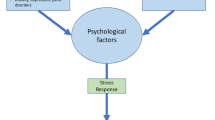Abstract
Preoperative anxiety and lower self-efficacy are often associated with poor surgical outcomes. Although preoperative counseling is considered to be an essential element of enhanced recovery after surgery (ERAS), there is little evidence to indicate the application of formal behavioral therapy, such as cognitive behavioral therapy (CBT). However, CBT can be an effective instrument in changing patient behavior toward their long-term health patterns and habits. Within prehabilitation, patient counseling to address their emotional needs and self-efficacy is an integral part to enhance compliance with multimodal interventions to improve their whole wellbeing prior to surgery. CBT should involve a collaborative approach that is problem-oriented and time-limited and that is directed toward recovery. This drives the effectiveness of CBT within ERAS.
Access this chapter
Tax calculation will be finalised at checkout
Purchases are for personal use only
Similar content being viewed by others
References
Forsmo H, Pfeffer F, Rasdal A, Østgaard G, Mohn A, Körner H, Erichsen C. Compliance with enhanced recovery after surgery criteria and preoperative and postoperative counselling reduces length of hospital stay in colorectal surgery: results of a randomized controlled trial. Color Dis. 2016;18(6):603–11.
Lindbäck Y, Tropp H, Enthoven P, Abbott A, Öberg B. PREPARE: presurgery physiotherapy for patients with degenerative lumbar spine disorder: a randomized controlled trial. Spine J. 2018;18(8):1347–55.
Louw A, Diener I, Landers M, Zimney K, Puentedura E. Three-year follow-up of a randomized controlled trial comparing preoperative neuroscience education for patients undergoing surgery for lumbar radiculopathy. J Spine Surg. 2016;2(4):289–98.
nhs.uk. Cognitive behavioural therapy (CBT). 2019. Available at: https://www.nhs.uk/conditions/cognitive-behavioural-therapy-cbt/. Accessed 18 July 2019.
Bandura A. Human agency in social cognitive theory. Am Psychol. 1989;44(9):1175–84.
Maddux JE. Expectancies and the social-cognitive perspective: basic principles, processes, and variables. In: Kirsch I, editor. How expectancies shape behavior. Washington, DC: American Psychological Association; 1999. p. 17–40.
Bandura A, Cervone D. Self-evaluative and self-efficacy mechanisms governing the motivational effects of goal systems. J Pers Soc Psychol. 1983;45(5):1017–28.
Sun JCY, Rueda R. Situational interest, computer self-efficacy and self-regulation: their impact on student engagement in distance education. Br J Educ Technol. 2012;43(2):191–204.
Zinken KM, Cradock S, Skinner TC. Analysis System for Self-Efficacy Training (ASSET). Assessing treatment fidelity of self-management interventions. Patient Educ Couns. 2008;72(2):186–93.
Carli F, Zavorsky GS. Optimizing functional exercise capacity in the elderly surgical population. Curr Opin Clin Nutr Metab Care. 2005;8:23–32.
Santa Mina D, Matthew A, Hilton W, Au D, Awasthi R, Alibhai S, et al. Prehabilitation for men undergoing radical prostatectomy: a multi-centre, pilot randomized controlled trial. BMC Surg. 2014;14:89.
Luther A, Gabriel J, Watson R, Francis N. The impact of total body prehabilitation on post-operative outcomes after major abdominal surgery: a systematic review. World J Surg. 2018;42(9):2781–91.
Wright J. Cognitive behavior therapy: basic principles and recent advances. Focus. 2006;4(2):173–8.
Tinetti M, Naik A, Dodson J. Moving from disease-centered to patient goals–directed care for patients with multiple chronic conditions. JAMA Cardiol. 2016;1(1):9.
Kabat-Zinn J. Wherever you go, there you are: mindfulness meditation in everyday life. Hyperion: New York; 1994.
Kabat-Zinn J. Mindfulness-based interventions in context: past, present and future. Clin Psychol: Sci Pract. 2003;10(1):144–56.
Hayes SC, Follette VM, Lineham MM, editors. Mindfulness and acceptance: expanding the cognitive-behavioural tradition. New York: Guilford Press; 2011.
Author information
Authors and Affiliations
Corresponding author
Editor information
Editors and Affiliations
Rights and permissions
Copyright information
© 2020 Springer Nature Switzerland AG
About this chapter
Cite this chapter
Spencer, C.L., Court, E.L., Francis, N.K. (2020). Cognitive Behavior Counseling: Preoperative Preparation in ERAS. In: Ljungqvist, O., Francis, N., Urman, R. (eds) Enhanced Recovery After Surgery. Springer, Cham. https://doi.org/10.1007/978-3-030-33443-7_11
Download citation
DOI: https://doi.org/10.1007/978-3-030-33443-7_11
Published:
Publisher Name: Springer, Cham
Print ISBN: 978-3-030-33442-0
Online ISBN: 978-3-030-33443-7
eBook Packages: MedicineMedicine (R0)




